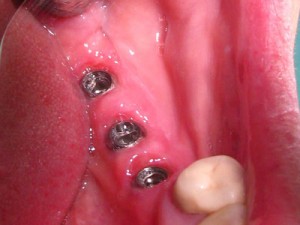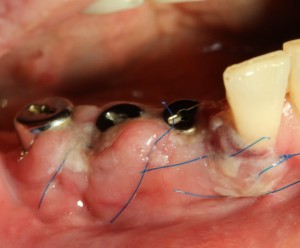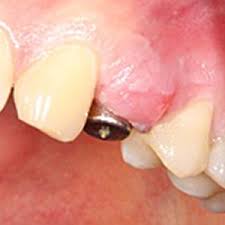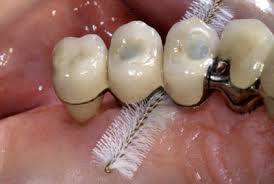Postoperative period after dental implantation

Dental implantation often much easier than postoperative period.
It must be understood that no matter how wonderful the surgeon who performed the surgery, implant implantation is tissue injury that can lead to complications.
To avoid postoperative complications, it is very important to clearly follow this period. recommendations of the dentist.
The condition after implantation of the teeth of the oral cavity is such that it is vulnerable to the development of infectious complications associated with bacteria entering the mucous membrane.
In this regard, in the postoperative period, therapy is aimed at preventing infection from entering the surgical field and accelerating the healing of the wound surface.
Therefore, in the postoperative period, antibacterial drugs are prescribed, both orally and for topical use.
Complications
In the early postoperative period, the following symptoms may appear:

- The appearance of edema or bleeding in the surgical area. To reduce puffiness, ice should be applied to the cheek in the area of the installed implant for twenty minutes every half hour during the first day.
- Health after dental implants can suffer due to pain or fever. All these unpleasant sensations are removed with the help of painkillers.
Within three to five days, usually all these symptoms disappear on their own.
In the post-implantation period, the following complications are rare:
- The presence of severe pain.
- Fever.
- Numbness of the jaw.
- Bleeding.
- The formation of a hematoma.
- Divergence of seams.
- The development of the inflammatory process in the field of surgical intervention.
The main causes of such complications may be:
- Failure by the patient to recommend a doctor.
- Violation of the technology of preparation and conduct of surgical intervention.
- Features of the patient’s body.
Complications arising in the late postoperative period:

- Reimplantitis is an inflammation of the tissues around the implant. The destruction of the bone tissue surrounding the implant occurs.
Causes of Reimplantitis:
- Hemorrhage over the plug with the subsequent development of suppuration.
- Incomplete closure of the surgical wound.
- Violation of the technique of preparation of the bone bed.
- Lack of oral hygiene.
The main treatment method is to remove the hematoma and eliminate the causes of inflammation.
In the absence of a treatment result, the implant is removed and bone tissue is restored.
- Implant rejection. It is very rare.The cause of rejection may be the presence of an inflammatory process, a burn of bone tissue during implantation, osteoporosis of bones. In this situation, the implant is also removed.
Video: “Possible complications after dental implants”
Rehabilitation after implantation
During the first two weeks after surgery, the following recommendations must be observed:
- Exclude alcohol, smoking, eating spicy, hot foods.
- You need to eat finely ground, semi-liquid food.
- Avoid a sharp rush of blood to the head, for which avoid stress, exercise and other physical exertion.
- Refrain from climbing to a height, and also exclude air travel.
- Refuse to visit the bath, pool.
- Ensure the most gentle regime of the wound surface and the entire area where the implant was implanted.
- Do not spit, do not drink liquid through a straw.
- Rinse your mouth with antiseptic solutions.
- In the first days after surgery, it is better to sleep on a high pillow.
The most important factor preventing the development of complications in the postoperative period is proper oral hygiene.
It is important to know that when brushing your teeth you should not touch the implantation site. This area must be treated with a moistened swab in saline. On the second day after implantation, you can use the so-called oral baths on the operated area.
How to care for implants after the postoperative period

- The care for implants is the same as for teeth using a toothbrush with toothpaste, using floss (dental floss), brush, and rinsing.
- Structural care affects only the protruding portion of the implant. Special care is required on its lower part.
- Teeth should be brushed twice a day.
- Equally important for the care of implants is the use of an irrigator, which allows you to maintain the cleanliness of the oral cavity at the highest level.
Questions and answers
Dental implantation is today one of the most popular procedures. Installed implants are no different from real teeth, both in aesthetics and in sensations. If you take into account contraindications for dental implantation, you can easily avoid complications in the postoperative period.
Answers to frequently asked questions will help you understand how to behave correctly in the post-implantation period.
- Question: How does rehabilitation take place after implant placement?
Answer: There is a medical protocol. It includes examinations of the patient, taking medications. Wound healing takes place within seven days.
- Question: Is implant rejection possible?
Answer: This is a clinical case that is very rare.
- Question: Is it true that alcohol and smoking can cause complications after implantation?
Answer: Smoking affects the engraftment of a titanium rod and its life. Alcohol can cause complications at the household level.
- Question: How and what can I eat with implants without crowns?
Answer: For the first time, it is enough to install plastic crowns or temporary removable structures that are convenient to eat with. In the first days after surgery, the food should be soft and mashed.
- Question: Do I need to take any medications after implantation?
Answer: Yes. It is necessary to take anti-inflammatory, antibacterial, painkillers and general strengthening drugs. It is important to care for the oral cavity using antibacterial, regenerating agents.
- Question: Can the implant rot?
Answer: Not. Titanium does not rot. Destruction of the bone tissue surrounding the implant may occur or soft tissue inflammation may begin.